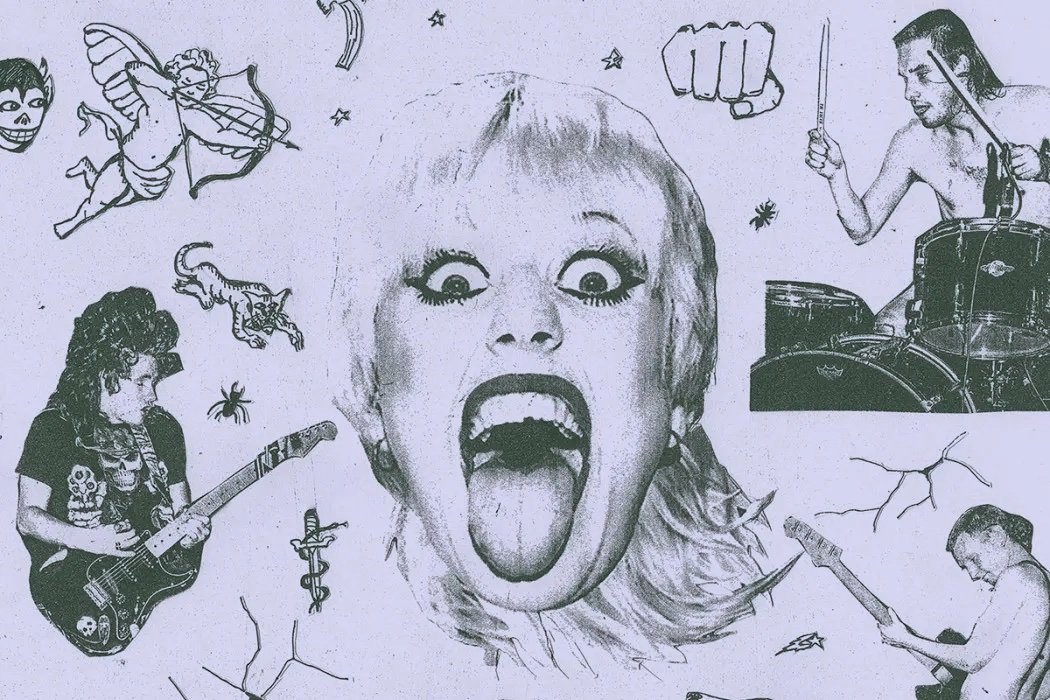My Evolving Relationship With Femininity
Last summer, I went to see Amyl and the Sniffers at the Ogden theater. The opening band was this all girls group, Die Spitz, that I’d never seen before but became quickly drawn to. They were on stage ripping the shit out their instruments, and performing with such fervor, it was impossible to look away. They were loud in their energy and in their music. They were so locked into their sound and their craft, they couldn’t care less who was watching them or what they thought. The lead singer was in a tight plaid skirt and stilettos and the girl on electric guitar wore baggy pants and an off-white graphic tee. Their jewelry dangled in unison with the movement, and despite the obvious individuality of each woman on stage, there was this sense of togetherness that was magnetic. It was womanhood embodied. As I looked up there, I couldn’t help but think that this experience, this group of women performing together on stage, was the epitome of what it means to be feminine. At least according to my definition.
Amyl and the Sniffers came on later, and the madness continued. Amy was the most unshackled woman I’ve seen in real life. She carried herself with this wild, unhinged energy; something I’ve always craved but have yet to fully achieve. She danced freely and performed her songs with a simultaneous furiosity and joy.
I had an epiphany at the concert that night. Amy was a force. She was intelligent, creative, beautiful, athletic, and witty- and she was girly as f*ck.
My 10 year old self had a complicated relationship with the word “girly.” It was everything I worked not to be. It was pink and weak and quiet, and it embodied the girl I was taught to despise from a young age. Whether it was intentional or conscious depended on the context, but all of these external forces in my life were spoon feeding me messaging that said there was something wrong with being a certain type of woman- a feminine woman if you will.
I grew up in a community strongly centered around sport. In a lot of ways, it was beneficial. Being an athlete is at the core of my identity and I got to grow up moving my body outside, which has given me a lifelong outlet. It was harmful because with competitive sport comes a culture of extreme comparison, the infamous thief of joy. Being a female athlete meant I was not only comparing myself to other female athletes, but to every man in that realm- a habit of thinking that leads to an endless cycle of dissatisfaction and exhaustion. What I didn’t put together until later, was that my skewed relationship to femininity was deeply tied to this constant pattern of comparison. Definitions of success in sport have long been tied to what men define as successful. Because mostly everyone around me held this male-centered perspective (whether they were conscious of it or not), I couldn’t help but feel like I wasn’t good enough if I didn’t achieve those standards of success. Basically, I’ve long associated success with notions of masculinity, and in turn, failure with femininity. I hadn’t realized until recently how damaging and deeply ingrained that belief has been in me.
Before understanding social construction, I thought femininity was something concrete, and that it was something I was not. Even though I knew that being “ultra feminine” was tied to lack of respect (at least in the community I grew up in), I also knew that it was tied to desirability. So that was something I had decided: If I wasn’t feminine, I also wasn’t desirable. To myself, or to anyone else. But to me, that was the price to pay. If I wanted to be a strong athlete and an intelligent person, I could not be girly. Not only that, but I would limit my openness and negatively perceive those who were.
In my later years of highschool and college, I started to understand that gender was a big fabricated concept, and all these negative associations with femininity that I had internalized, were also made up. It was a typical knowledge is liberation type situation.
That being said, just recognizing that something is socially constructed doesn’t automatically deconstruct it. Just like any sort of skill, deconstruction takes a whole bunch of practice and repetition. I’ve since had to be super intentional about how I perceive things, and continuously reminding myself that femininity is not failure. It’s just some construct that boxes people in.
At the end of the day, analyzing my relationship to femininity is all tied to some big attempt to figure out who I am and who I want to evolve into. It's an attempt to become someone who can navigate this weird ass life feeling content in my own skin.
Amyl and the Sniffers Album Cover


